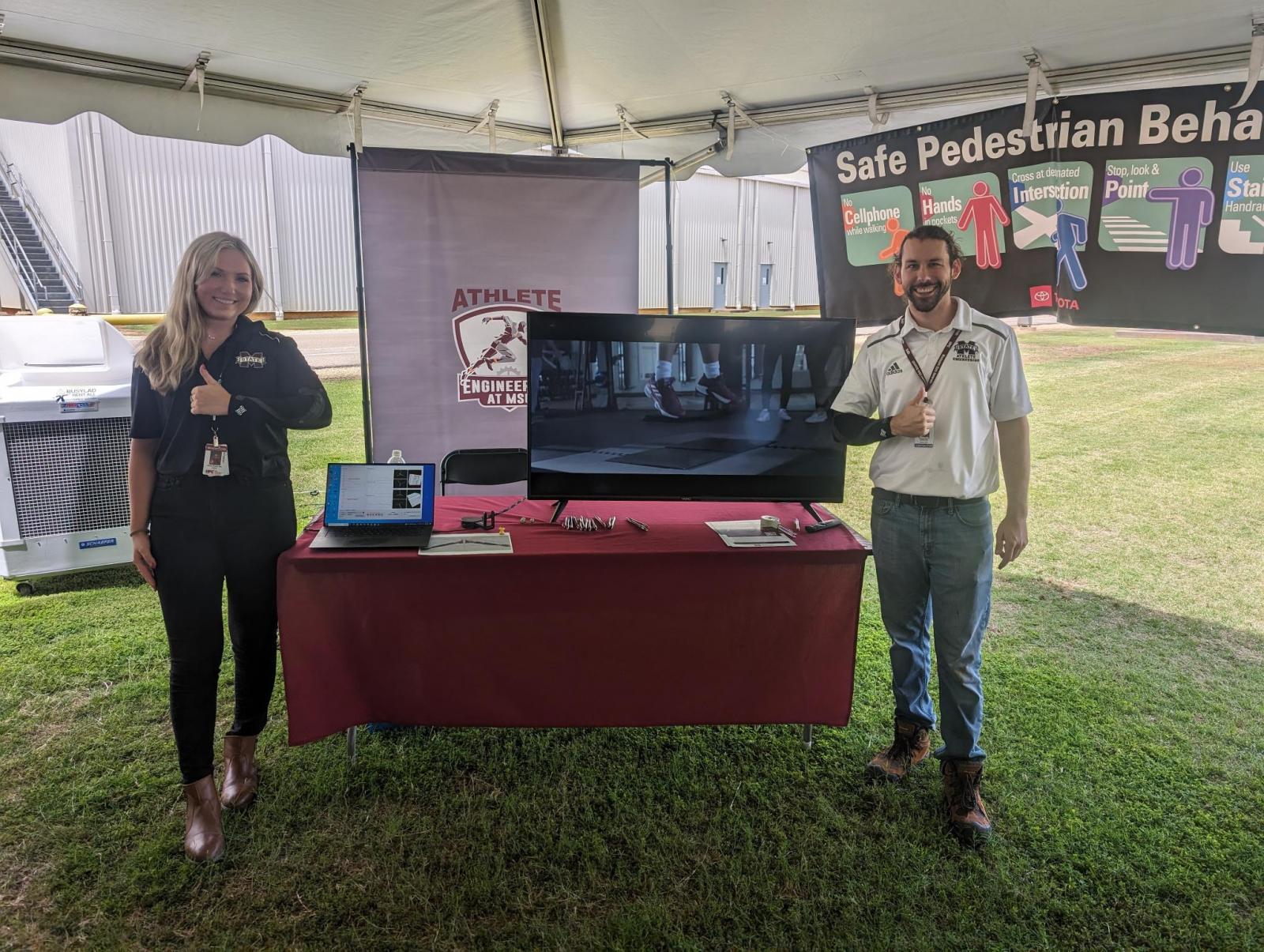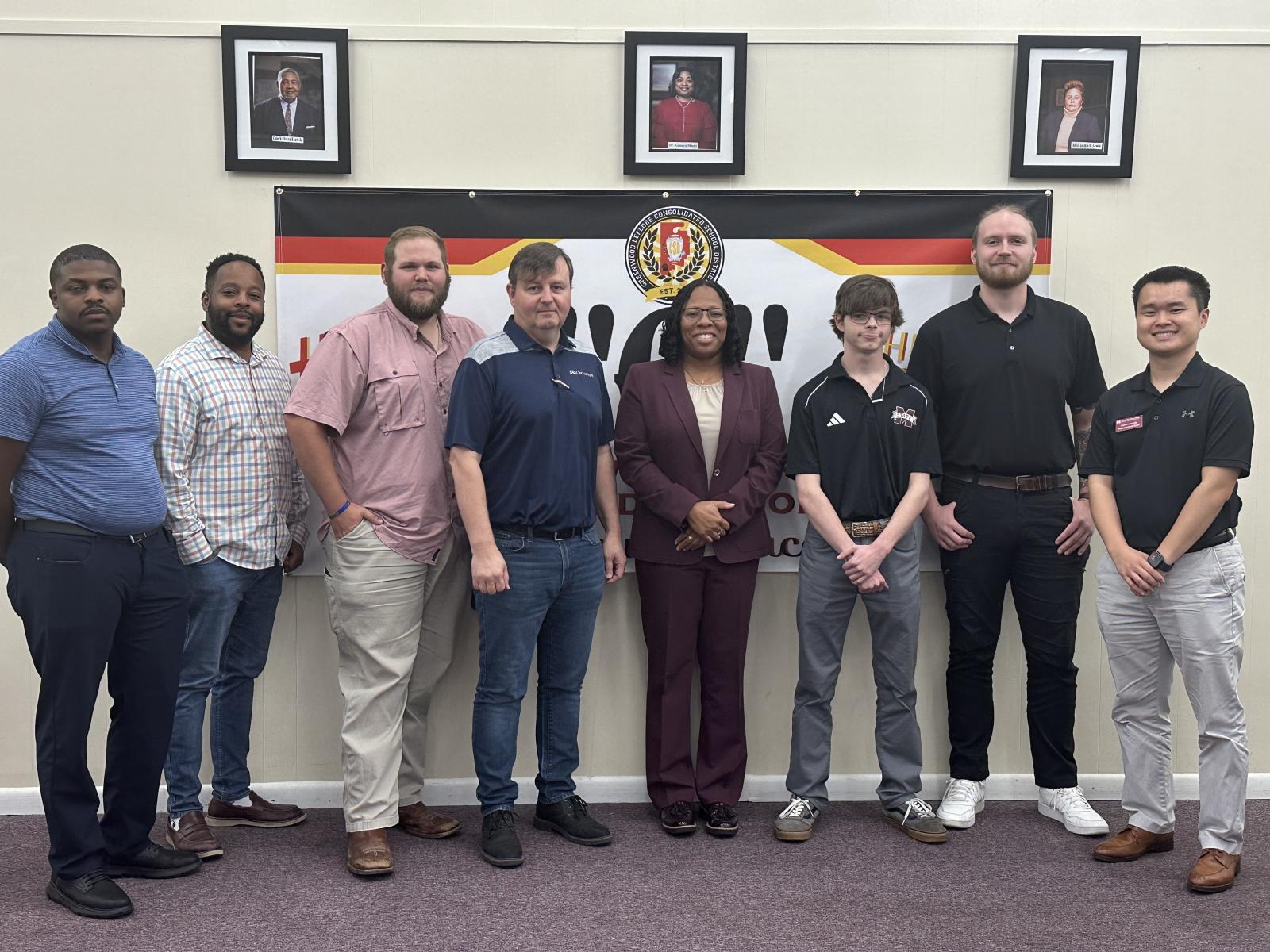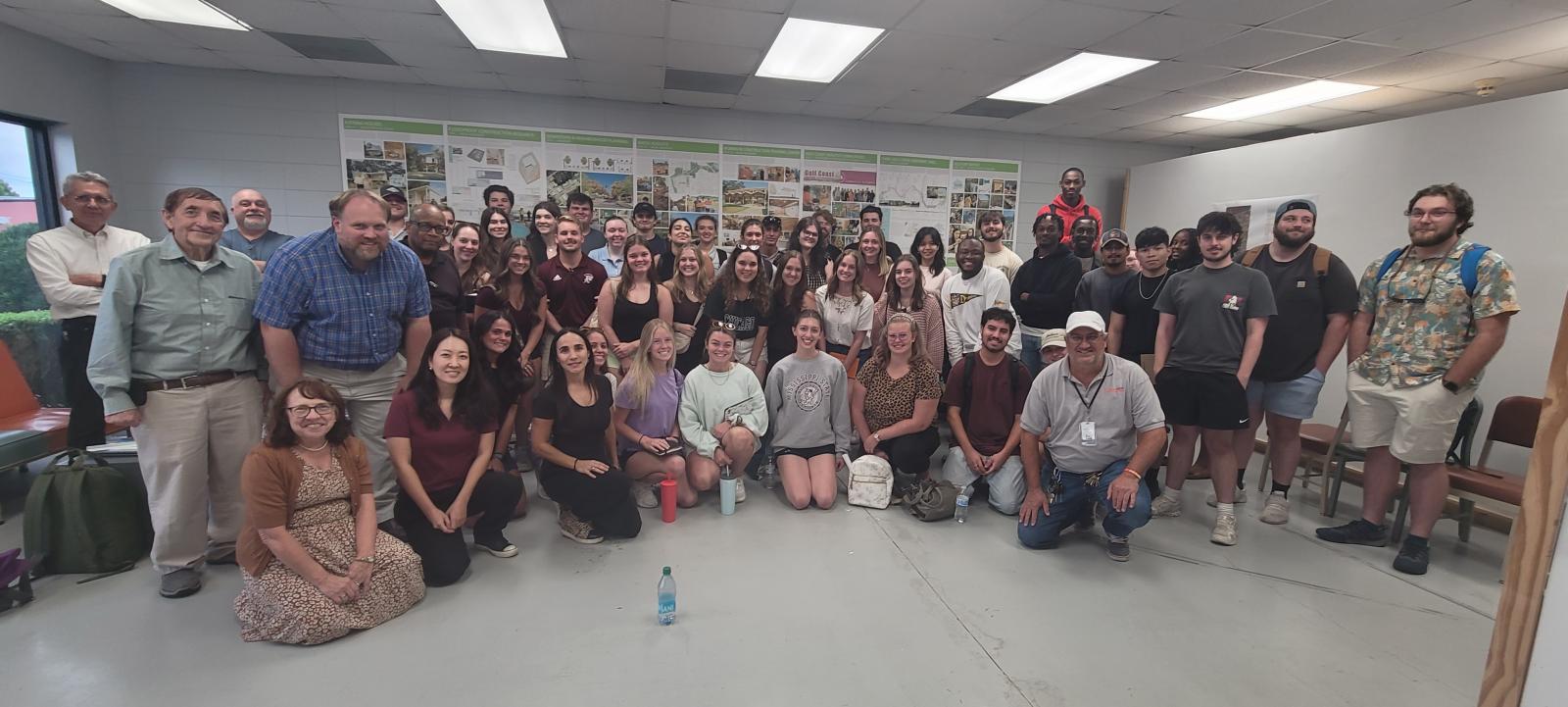Community engagement projects recognized at MSU with annual awards
Contact: Michelle Garraway
STARKVILLE, Miss.—Mississippi State is honoring six outreach and engagement projects with the university’s seventh annual Excellence in Community Engagement Awards.
Winners, awarded in three categories for 2024, include community-engaged research, service, and teaching and learning.
Winning projects are awarded $3,000 and honorable mention $750 to further the engagement projects. Recipients were selected by MSU’s Center for Community-Engaged Learning, Office of the Provost and Executive Vice President, Office of Research and Economic Development and Division of Student Affairs.
Honorees include (by category):

Community-Engaged Research winner:
Toyota Wearable-Liquid Wire Integration
David Saucier, Lesley Strawderman, Anna Grace Dill, Kaitlyn McDonald
The Toyota Paint-Liquid Wire Wearable Integration and Reporting Study is a collaborative initiative between MSU’s Athlete Engineering Institute, Liquid Wire, Inc., or LW, and Toyota Motor Manufacturing, Mississippi, or TMMMS. The primary goal is to integrate advanced wearable technology to detect movement patterns at the elbow and forearm, which indicate overall performance and risk of injury during the paint sealer task.
The project aims to conduct individual worker assessments to establish a baseline for performance and risk of injury, validate the LW sleeve in both lab and real-world settings, develop and implement training materials for the sleeve, manage the equipment issue room for proper device maintenance and data synchronization, and roll out the use of the sleeve on the sealer line with custom reporting dashboards in Power BI.
Significant progress has been made, including the completion of several site visits, development of training materials, and validation of the LW sleeve. The project also has established a continuous assessment cycle and initiated development of custom reporting dashboards.
Lastly, the Athlete Engineering Institute team attended the TMMMS Safety and Health Fair to demonstrate the sleeve to TMMMS employees and help promote cultural adoption of wearable technology. Future implications include improved safety and performance for workers at TMMMS, potential adoption of the sleeve technology in other manufacturing settings, and the establishment of MSU as a leader in wearable technology research and implementation in industrial environments.

Community-Engaged Service winner:
Cybersecurity Assessments in K-12 Schools
Devin Chen, Gavin Seiler, George Trawick, Shelly Hollis
MSU students from the Department of Computer Science and Engineering, in collaboration with the Center for Cyber Education and Center for Cyber Innovation have been conducting cybersecurity risk assessments over the past two semesters. These efforts aim to help public school districts strengthen their cyber defenses while equipping students with valuable workforce-ready technical skills. A cyber breach can disrupt learning and force schools to close temporarily. This, in turn, forces parents to leave work and creates ripple effects across local businesses, highlighting the far-reaching nature of K-12 cybersecurity challenges.
The assessment process involves outreach to schools and on-site evaluations by MSU students using the Cybersecurity and Infrastructure Security Agency, or CISA, Cross-sector Performance Goals tool to measure cyber readiness. MSU students schedule assessments with school districts and then meet with the district information technology staff and other relevant school personnel to review the school’s current cybersecurity posture. Using the CISA CPG tool, the MSU student team produces a report of recommendations to the school district on ways to strengthen their cyber position based on cost, ease of implementation and impact on security.
The team’s vision is to establish a “doctor’s visit” model, where every school district in Mississippi receives an annual assessment. Ultimately, they hope to develop a scalable, national model that other universities could adopt to help schools and small businesses in their state.
Community-Engaged Service honorable mention:
Enhancing Senior Wellness
Zhujun Pan, John Lamberth
Facilitated by faculty in MSU’s Department of Kinesiology, the Mississippi Bingocize Project, funded by the U.S. Centers for Medicare and Medicaid Services, or CMS, is an innovative program designed to improve physical activity, social interaction and quality of life for residents in certified nursing facilities, or CNFs, across Mississippi. By integrating exercise with bingo, the project engages older adults in a fun, evidence-based health promotion activity.
Since its launch, the program has trained 209 facilitators, including 66 CNF staff and 137 university students pursuing healthcare and geriatric nursing careers. Over 20 CNFs have participated, and 15 facilities have hosted Bingocize sessions and engaged more than 1,850 attendees to date. The project also has expanded its reach through collaborations with the Mississippi State Department of Health and the Fall Prevention Task Force. These partnerships enabled the team to promote Bingocize during events like Mississippi Fall Prevention Week, where they shared program resources with healthcare professionals to encourage further adoption.
This program has demonstrated its potential as a scalable, impactful model for enhancing health and social well-being among older adults in long-term care settings.

Community-Engaged Teaching and Learning winner:
Gulf Coast Interdisciplinary Studio
SaMin Han, Silvina Lopez Barrera, David Perkes
The Gulf Coast Interdisciplinary Studio, or GCIS, is a collaborative initiative focused on climate resilience along the Gulf Coast. Developed by the MSU School of Architecture and Department of Landscape Architecture, in partnership with the Gulf Coast Community Design Studio, GCIS supports communities affected by disasters like Hurricane Katrina and the BP Oil Spill, which have worsened socio-economic inequalities and left lasting impacts on marginalized groups.
With funding from the National Academies of Sciences, Engineering, and Medicine, GCIS partners with community organizations such as Steps Coalition and the East Biloxi Collaborative to create adaptive design strategies that address climate challenges and revitalize underutilized sites. The project prioritizes under-resourced communities, particularly African American neighborhoods like East Biloxi, where redevelopment has been slow.
GCIS uses community-engaged teaching methods, including service-learning and research-based design, to develop sustainable solutions. Students work directly with community members through design workshops, public surveys, and interviews to create adaptive responses to rising sea levels, extreme weather and urban flooding.
Since fall 2023, 82 architecture and landscape architecture students have participated, with 16 earning regional design awards from the Mississippi Chapter of the American Society of Landscape Architects for their contributions. The interdisciplinary approach of GCIS also helps preserve cultural and social identity. Moving forward, GCIS aims to increase its impact on the Mississippi Gulf Coast by influencing policies related to housing, urban design, nature-based infrastructure and climate adaptation while building community resilience.
Community-Engaged Teaching and Learning honorable mention:
Bridging Academia and Manufacturing
Lu He
To provide practical experience for College of Business undergraduates to better learn supply chain management, this project bridges theoretical concepts with real-world applications. Over the past two years, this project has involved collaborations with diverse local businesses and leading manufacturers, including Starkville Strong, PACCAR, International Paper and Raytheon Technologies. Students have gained firsthand insights into supply chain interdependencies, efficient production and delivery, and process design through Gemba Walks—a management practice for on-site observations—as well as staff interviews, experiential learning activities and guest lectures.
Simulating the real-world project scenarios, students work in teams to address a real problem using DMAIC framework—a problem-solving methodology for continuous process improvement—to develop feasible solutions. This work culminates in an official presentation to industrial professionals who provide constructive feedback to guide students’ academic and career developments. This project not only broadens students’ exposure to manufacturing environments but also opens pathways to internships and full-time roles with partner organizations. Some students also reported that they applied these concepts to build and enhance their own businesses.
Community-Engaged Teaching and Learning honorable mention:
Food is Medicine
Sylvia Byrd, Drew Cole, Amanda Williams, Dottie Kenda, Kellie Whitten, Samantha Willcutt
Food is Medicine is a statewide initiative of the MSU Extension Supplemental Nutrition Education Program-Education, or SNAP-Ed, and the Expanded Food and Nutrition Education Program, or EFNEP. The initiative utilizes teaching kitchens to improve nutrition knowledge, food preparation skills, and food and nutrition security. Cooking Matters for Adults, or CMA, is an evidence-based curriculum with primary goals to improve participants’ nutritional knowledge, knife and food preparation skills, budgeting abilities, and acceptance of new foods to enhance overall health. To achieve these goals, the curriculum uses an experiential learning approach.
Participants engage in cooking demonstrations, nutrition education and practical budgeting exercises. The course is delivered by MSU Extension’s community wellness planners and nutrition educators in collaboration with a community partner through six weekly two-hour classes, each focusing on healthy eating and food preparation. Methods include live cooking sessions, shared tastings, group discussions and take-home assignments to reinforce learning. Additionally, in lessons one through four, participants take ingredients home to prepare a recipe utilized in the lesson to encourage skill-building and acceptance of new recipes for their families to try. Participants are encouraged to photograph and share pictures on social media.
Since the implementation of CMA in 2018, 224 courses have been offered statewide through 56 partners. Of over 2,000 participants, 1,743 graduated, for an 81% matriculation. Participants reported significant improvements in their confidence in cooking healthy meals, increased consumption of fruits and vegetables, and better food budgeting practices.
Mississippi State University is taking care of what matters. Learn more at www.msstate.edu.